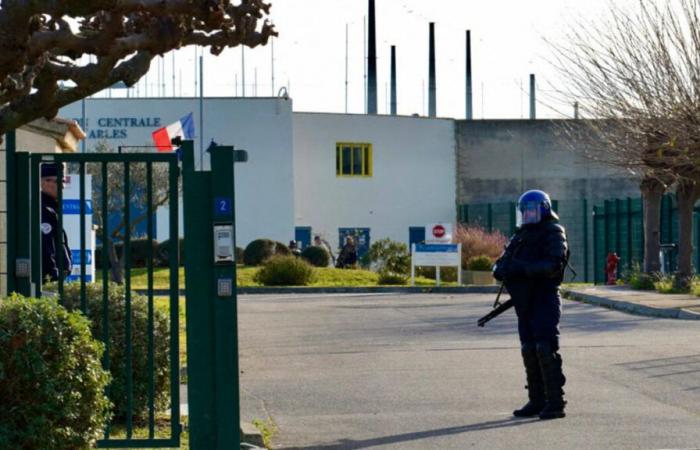
Two days after the tragedy, he spoke. Alberto, a guard who was among the five people taken hostage on Friday at Arles prison (Bouches-du-Rhône) by an inmate, released “unharmed” after long hours of negotiation, recounted his ordeal to several media. “We are never really prepared” for this kind of scene, he confided in particular to France Bleu. The prisoner, described as “very dangerous” by the police, eventually surrendered.
Alongside three nurses and a psychiatrist, this prison guard found himself stuck for five hours in the establishment’s infirmary. Around 10:30 a.m., the 37-year-old prisoner went there to receive treatment. “He asked me to go to the toilet and he came out armed”, with a “homemade weapon”, which he would have hidden in “his hair, because he had dreadlocks”, rewinds Alberto on Saturday to France Bleu, explaining that he had not seen anything suspicious so far.
He was then “armed with large spikes wedged between his fingers”, also details the supervisor at the RTL microphone. The detainee had acted with “a weapon that he had made” with “metal picks”, the Bouches-du-Rhône police prefect, Pierre-Edouard Colliex, reported on Friday.
“Things to say or not to say”
The man then used a “very heavy” medical bed to block the door. “He made me understand that he would not leave there”, unless “he was transferred”, continues Alberto on France Bleu, according to whom the hostage taker, a national of Guyana, complained of being “mistreated” and experiencing “injustice and racism” within the penitentiary center. Alongside the medical staff, he waits for “his anger to go down”, but “he has some problems, so it’s complicated: it goes up and down”, describes the prison guard.
A very delicate exchange with an inmate who indeed presents psychiatric disorders, according to several sources. “He told me at one point that he was a great sorcerer (…), I remain in his story. (…) We know that he has problems, there are things to say or not to say,” Alberto told RTL.
VideoAn inmate at Arles prison took five people hostage with homemade picks
Throughout this scene, the supervisor decides to position himself in front of him: “I had a blade vest. (…) I prefer to be in the middle than to put medical personnel in danger without any protection,” he assures on France Bleu. The psychiatrist, who had a child, then managed to free herself, after long negotiations, then a Raid negotiator intervened by telephone. “It was a long journey to achieve what (the inmate) understood that we were doing what was necessary to try to get him to leave, in the end he had his transfer authorization,” he explains. “The Raid intervenes, controls it, they put it on the ground and then it’s gone,” he explains to RTL. The end of a long ordeal.
The thirty-year-old, who was serving an 18-year prison sentence for rape at gunpoint in the Arles central prison, seemed to have the “motive” to change establishments, but “there was no of a precise, written request, as prisoners can do with the prison administration”, however, the Tarascon prosecutor emphasized on Friday.
“Somewhere, luckily it was me”
Alberto, who has worked in the prison world for ten years, still finds it difficult to put into words his experience, after this traumatic experience. “It remains something unusual, for which we are never really prepared,” he only summarized to local radio. He denies any heroism: “It’s normal, I did what I had to do,” he told RTL. Before slipping: “The inmate told us that if it had been another supervisor than me, he would have planted him. (…) Somewhere, fortunately it was me.”
“He showed great courage, he was ready to make the sacrifice if it was necessary,” greets one of Alberto’s colleagues on the same radio. “We were lucky to have a great professional, someone with experience who knew how to keep the staff as safe as possible,” he continues, speaking on condition of anonymity.
This professional was part of a group of supervisors who had “positioned themselves to secure the area” as soon as the alarm was triggered, and was able to follow the scene through the glass and thanks to the infirmary cameras. The detainee “had barricaded himself and was preparing for a possible attack” and was “very agitated”, he also describes, also pointing to “artisanal type weapons made with iron”, regretting in passing that the prisoners had “ so much in the cell” to “arm yourself”.
Placed in police custody, the prisoner was finally hospitalized in a psychiatric unit, on the recommendation of a psychiatric expert, the Tarascon public prosecutor, Laurent Gumbau, told AFP on Saturday.





